Egg Incubator Facts and Information
I own the best incubator. I only say that my chicken egg incubator is “the best” 😉 for several reasons:
- It’s as old as they come
- It’s homemade
- It gives me excellent hatch rates! (Even with it being homemade and quite old!)
But I have no experience with any of the newer incubators available. It wouldn’t make sense to leave behind my trusty old incubator when it’s working so well!
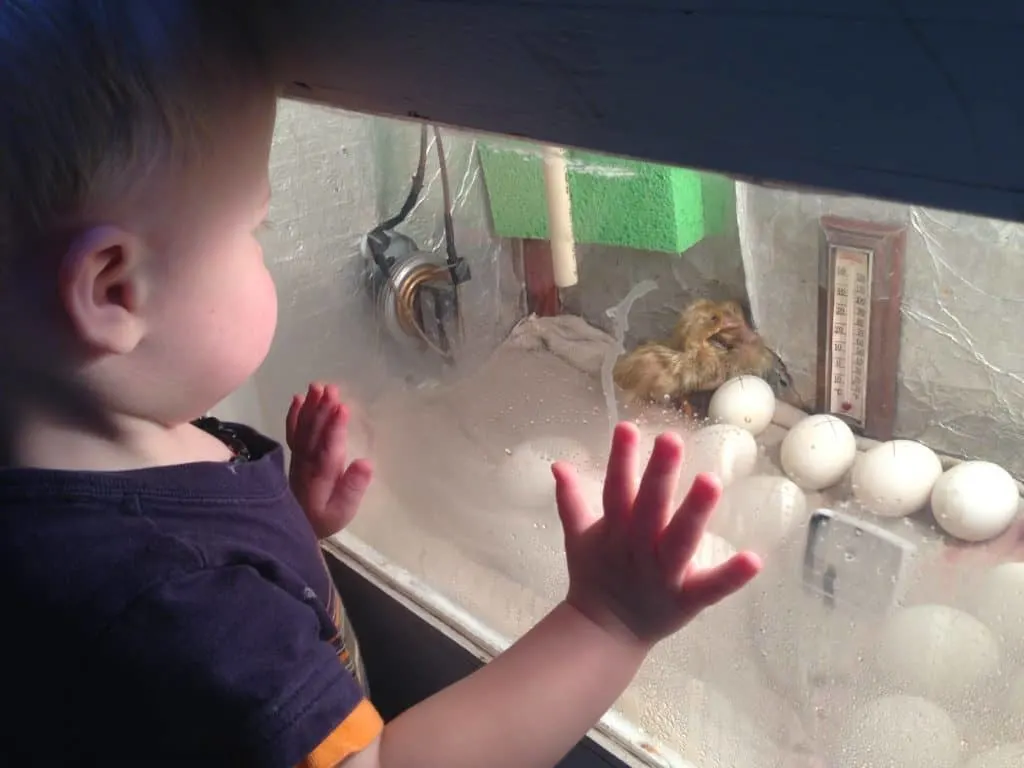
Egg Incubator Hatch Rate
My last hatch rate was 66%. I put in 18 duck eggs. 12 hatched, one died for an unknown reason within the last week before hatching, and 5 were clear, infertile eggs.
I had a bad experience with a homemade candler one time, and since then haven’t bought a candler and only take out eggs that are obviously heading south quickly. During that one bad candling day, all but three of the eggs died because the homemade candler I borrowed, got too hot. That was my deduction anyway when I opened the eggs after the hatching period had completed.
Although I’ve never purchased a new candler to take its place, it’s fascinating to see the development of the chick as the days go by so quickly.
Once you start incubating chicken (or duck!) eggs, you won’t be able to stop. It’s addicting. Fascinating. And the little critters that hatch, are the cutest.
I hatched my first eggs when I was in fourth grade for my science project. And I was hooked!
You can find a lot of articles here on A Life of Heritage that will teach you a lot about poultry and be sure to check out Chicken Rich: Profitable Poultry Bundle–It’s FULL of to-do lists, checklists, record keeping sheets, and resource pages that will keep your flock healthy and YOU organized!
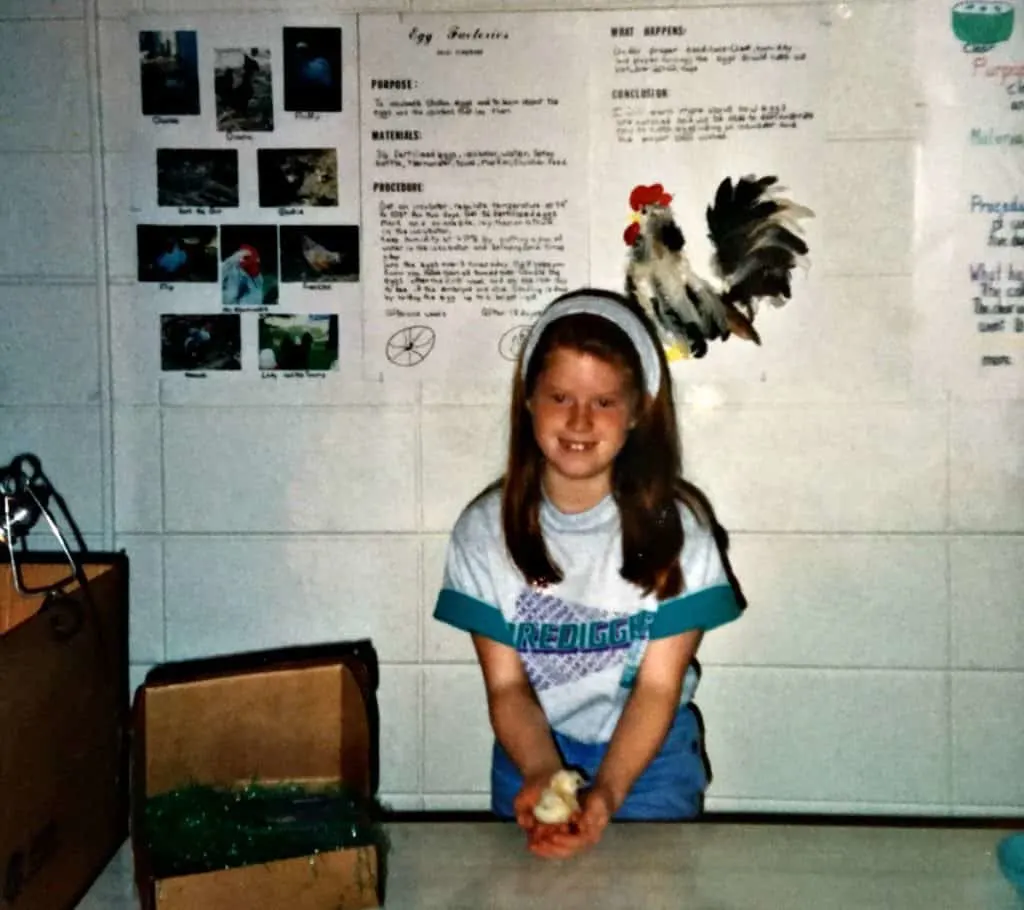
But first, what is an incubator?
“In biology, an incubator is a device used to grow and maintain microbiological cultures or cell cultures. The incubator maintains an optimal temperature, humidity and other conditions such as the carbon dioxide (CO2) and oxygen content of the atmosphere inside.” ~Source
How do egg incubators work?
An egg incubator simulates the temperature, humidity, and turning that a mother fowl will give eggs she is setting on. She is the master of keeping her eggs just right until they hatch. But egg incubators, whether kept at proper temperatures manual or automatically, do a wonderful job of imitating the beautiful work of nature.
Egg incubators are enclosed containers (all of different sizes, shapes, and abilities) that keep the temperature and humidity at optimal levels for hatching and many of them turn the eggs automatically. But if a hands-on experience is an important factor, there are incubators that require manual turning and humidity control as well.
Can eggs be hatched from the store?
No, they cannot. Only fertile eggs can hatch. If using eggs from a local farmer, make sure that there has been a rooster available to the hens before collecting any eggs.
When can you start candling eggs?
The first week of an egg’s development is a very critical period, it is very important to be very careful in handling eggs and not candle the eggs in the first week of incubating. After day 7 or 8, it is quite alright to candle eggs keeping in mind to handle them very carefully and not allowing them to get too cold outside of the incubator or too hot next to the light. They can be candled again between the 14 and 16 days as well.
If you are interested and looking for a really good incubator and you have the skills (or know someone else with the skills) to build your own incubator. I highly recommend this one. Although my incubator is probably 30+ years old, I can attest to the fact that it does the job well.
The plans for the incubator instructions mentioned in this post are to build a display egg incubator to accommodate up to 100 large eggs and can be built, complete with a heating element, thermostat, and mechanical egg turner. If I were to build another one like the one I already have, I would need assistance in building it.
My incubator was not made with the mechanical egg turner, so I turn the eggs by hand and the humidity is kept up with a spray bottle when the eggs are turned and with pans of water and wet sponges.
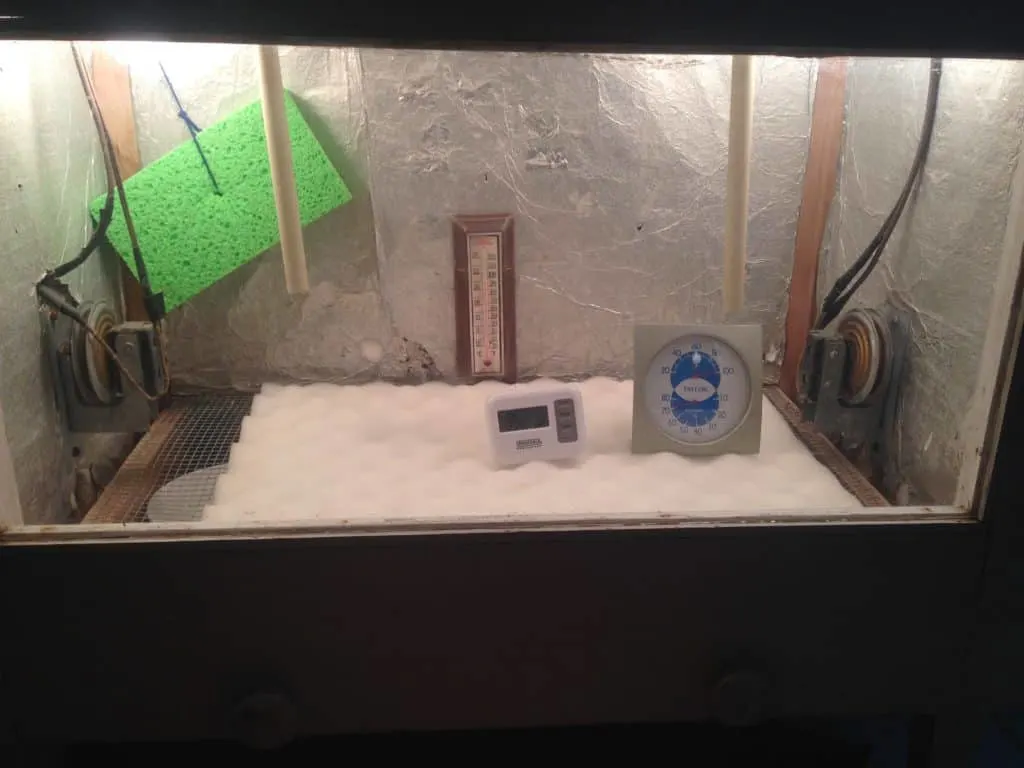
Why do I believe it’s “the best” homemade egg incubator? Well, for several reasons:
- I keep two thermometers in the incubator for accountability. If they both are reading different temperatures, I know there is a problem and can change batteries or get a new thermometer. Changes in temperature are one of the most important factors to pay attention to. Too hot and the chicks will die. Too cold and the chicks will die or develop slowly and cause frustration at the end of the hatch cycle. In this incubator, I have direct control of how hot the temperatures are. It is very easy to keep the temperature at a very regular, proper temperature.
- I also keep a very close eye on the humidity. Humidity is also very, very important. Again, in this incubator, this is something I have direct control over. Humidity is controlled by pans of water, sponges, and a spray bottle. It is very easy to adjust and regulate the humidity.
- The eggs in my particular incubator are turned by hand. It does take that extra moment to make the quick turn but that also makes me stop and check the temperatures throughout the day as well.
- Not only can it hold a large (or small) amount of eggs, the viewing of the hatching is incredible! That’s the best part of the whole hatching process!
All of this adds up to happy hatching!
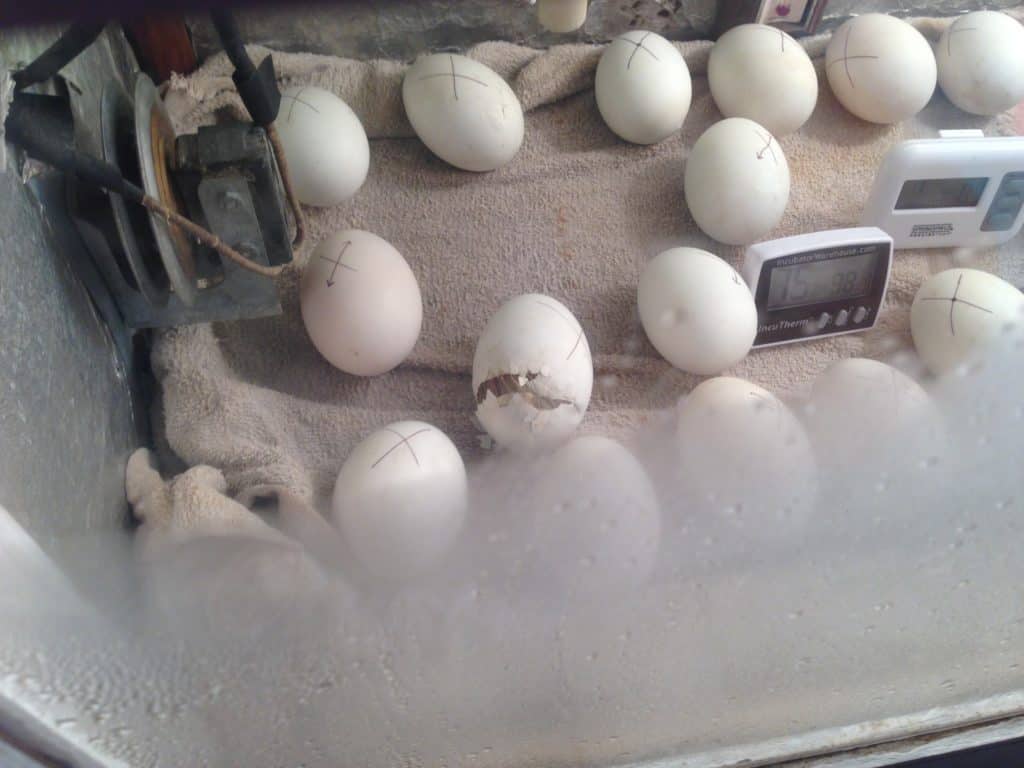
Besides having fertile eggs, the incubator you choose is the most important decision you will make if you plan on regularly hatching eggs.
Find more information below on the different incubator options available and very important information to consider before choosing your incubator, so you can choose the best egg incubator for your needs and setup.
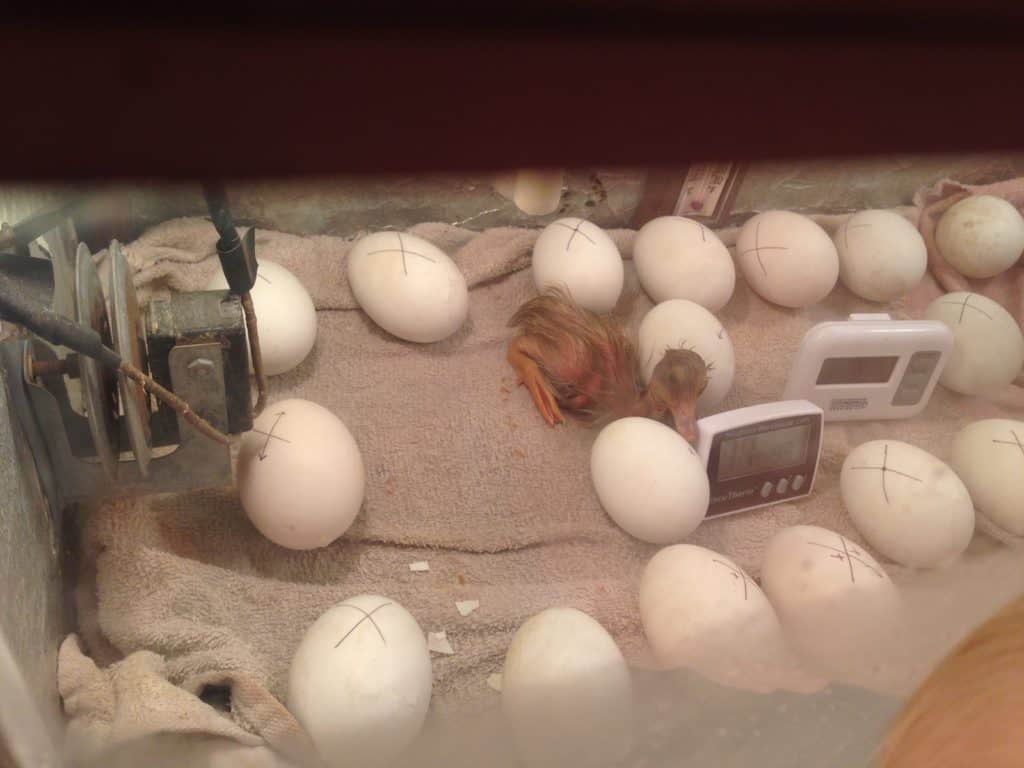
I’ve added the complete set of plans and pictures to our free resource page to keep all of our available resources together for easy access.
I hope you take a moment to check out the incubator plans and peruse through all the other free resources available as well!
It’s quick and easy to get access and you can visit the page over and over to print out material and find new material!
And also includes a handy checklist: Steps & Checklist for a Successful Duck Hatch
Download Incubator Instructions here
Important Considerations in Buying an Egg Incubator:
• Number of eggs to hatch
It’s important to decide how many eggs will be hatching at one time. There are many different models to choose from, all able to hatch varying amounts.
And it’s important to note that not every egg will hatch. Some eggs may be infertile, not develop correctly, or have a small crack for example. So in estimating how many eggs to hatch, keep this in mind.
Think about the size of the chicken yard you have available, how many eggs a day you potentially need, and if the funds and appropriate tools to care for the chickens are available.
• Space available for hatching
The space available in your house or situation will also determine which size egg incubator is suitable. Some are small enough to fit on a counter, while the one we own, is quite big and sits on the floor.
Another factor to consider in available space is how much room it will take to care for the eggs. A larger incubator that needs manual tending, may need more room to be able to get around it and to open doors to turn eggs and refill water.
• Space available for storage
Hatching won’t take place year-round, so there needs to be a good plan for storage when it’s not in use so that it doesn’t get ruined or broken while not being used.
• Automatic or manual turning of eggs
I love that ours makes it possible to be apart of the whole process. We manually turn the eggs each day and spray them and check the water pans. But sometimes that’s not possible or desired. Be realistic when choosing an incubator about the time and desire there really will be for the 21 day period.
• Heat and humidity gages included or not?
Some incubators include the appropriate gages to keep track of temperature and humidity. This is the most important part of the hatching! Wrong temperatures will kill chicks and wrong humidity can wreak just as much havoc! Some incubators will have a humidity pump and some, like ours, use pans and sponges and spraying the eggs to keep the humidity up. When shopping for an incubator, don’t forget to double-check if these are included or not depending on personal desires.
• Cost
There is a wide range of prices, all priced based on a wide variety of options. And some of the costs will go up the more automatic the incubator is. Again, deciding how much control and hands-on you want in the egg hatching process will factor into the cost.
This incubator is a great choice if you don’t desire to make your own incubator.
Which incubator is the best?
There are so many factors to consider but the choice below has a great many good features to consider.
What makes the “Homdox Automatic 48 Digital Clear Egg Incubator Hatcher“ a great choice?
Comes with a complete starter kit for chicks
- Viewing window (so important! Or what’s the fun in hatching??)
- A fan kit is included. This will keep the air moving so that the temperature inside is more accurate throughout the entire incubator.
- Automatic egg turner
- Includes a Digital Thermometer & Hygrometer
- And a candler
- Can hold quail, chicken, duck, or goose eggs
- 100V
When choosing an incubator it is so important to read the reviews. So many of the incubators online have their faults in keeping the eggs at the proper temperature and humidity. It cannot be stressed enough how important that is.
Further reading: Hatching Duck Eggs
Which incubator do you use and what is your hatch rate?
Thanks to Cooperative Extension Work in Agriculture and Home economics Agricultural Engineering Department Blacksburg, Virginia. U.S. Dept. of Agriculture Cooperating: Electric Display Incubator.
You can also watch this video on how to make one as well.



Lisa
Tuesday 29th of November 2016
We build our own, too! I have much better hatch rates with it than the one we bought and burnt!
Delci
Tuesday 29th of November 2016
I wonder why that is? As far as the home built ones working better, at least for us?